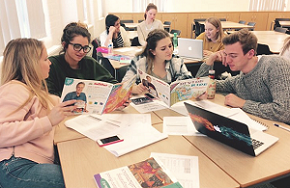Improve primary maths skills through storytelling
02 March 2017

An education researcher at the University of Reading has led a new project exploring the effectiveness of using imaginative storytelling to boost maths performance of primary school children.
The project is part of the non-profit MathsThroughStories.org initiative, founded and led by Dr. Natthapoj Vincent Trakulphadetkrai, a Lecturer in Primary Mathematics Education at the University’s Institute of Education. The project saw a pilot intervention study where around 30 Year 4 children (8-9 years old) at a primary school in Berkshire were asked to work in pairs to create a 5-page multiplication picturebook in their maths lessons over the course of one week. The preliminary findings suggest that children in the intervention class performed statistically better on the post-test than their peers in the comparison class, particularly in relation to solving multiplication problems.
Research over the past two decades show promising results of the use of stories in mathematics teaching and learning. However, these studies share common limitations in that their participants tended to be very young children (3-5 years old) and all the empirical studies conducted so far took place outside the UK.
MathsThroughStories.org was launched on Thursday, 2nd March 2017, to coincide with the World Book Day. The project’s website aims to provide teachers and parents research-based advice on how to integrate storytelling as part of mathematics teaching and learning.
Dr. Trakulphadetkrai from the University of Reading said:
“Our mission at MathsThroughStories is to help teachers (and parents) make mathematics learning more effective and enjoyable for learners of all ages through the power of imaginative storytelling.”
“Stories can help to contextualise or humanise mathematics, and when presented in the picturebook format with abstract mathematical concepts being visually represented to readers, they provide a useful tool to develop learners’ conceptual understanding. It is our hope that through our website, we can share our findings on the benefits (and some limitations) of teaching and learning mathematics through stories and creative writing.”
“Additionally, we aim to provide, through our website, the world’s largest database on stories that can be used to enrich mathematics teaching and learning.”
Anne Haworth, Chair of the General Council of the UK's Association of Teachers of Mathematics (ATM), said:
“One of the key features of the MathsThroughStories.org website is its extensive database of published storybooks with mathematical themes, classified according to areas of mathematics, such as place value, and to other resources. The site would be of great value to teachers who wish to enhance the learning of mathematics by the use of stories, and such teachers are encouraged to write about their experiences and develop resources, so the website will become increasingly rich as time goes on.”
